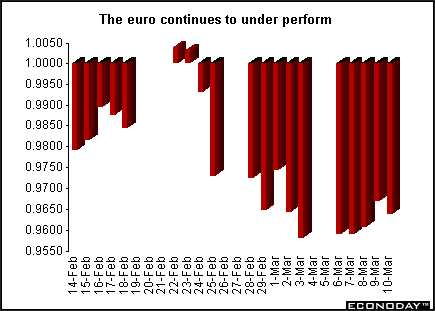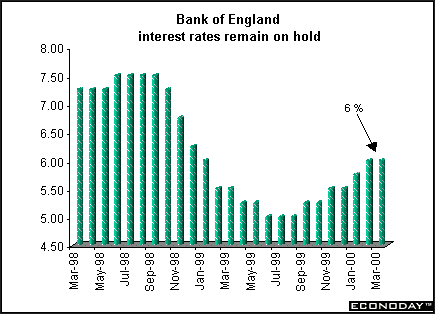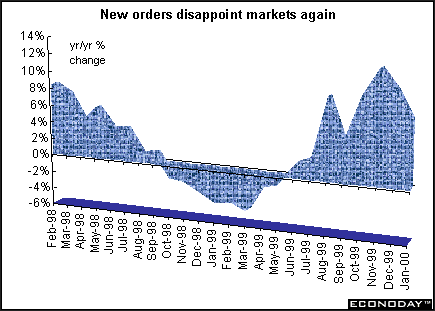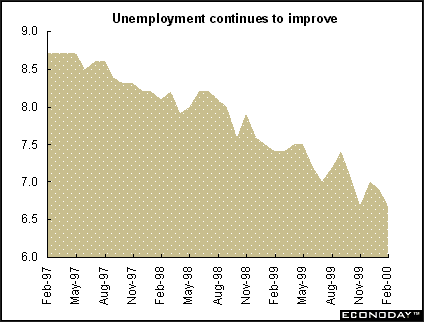| Previous Articles |
|
Equities
Europe
and Britain The FTSE was very much influenced by U.S. events, including speeches by Alan Greenspan and the SEC's Arthur Levitt as well as the Dow's plummet and the Nasdaq's new record. Add to this mix the Bank of England Monetary Policy Committee meeting on Wednesday and Thursday (where they left interest rates unchanged as expected). The FTSE 100 reshuffling resulted in some sharp price movements with many of the nine ejected stocks dropping. Despite all the ups and downs, the FTSE 100 turned in a better performance than the Paris CAC and Frankfurt DAX and ended the week at 6568.70, up 1.25 percent or 81.2 points.
The Frankfurt DAX burst through the 8,000 barrier on reports, confirmed later in the week, that Deutsche Bank and Dresdner Bank were merging. However, the DAX was undermined by profit taking and slipped below the magic 8,000 number. The DAX ended the week up 0.2 percent or 16 points at 7975.95. The Paris CAC caught a chill when the Dow fell below 10,000. Media and technology stocks, the new Parisian stars, were hit by profit taking. Stocks with telecom stakes were pulled down by the news from the Britain that two companies are planning to offer Internet access free of all fees including phone charges. On the week, the CAC eased down 0.1 percent or 4 points to end at 6510.28. Asia However, hot technology stocks drove the Hong Kong Hang Seng to a new record. The Hang Seng was the only index of the five Asian markets tracked that finished the week on a positive note. The index jumped 3.16 percent or 546.62 points to end the week at 17831.86.
Even though the Australian All Ordinaries managed to clinch a fourth consecutive record closing high during the week, it slid 26.30 points or 0.82 percent to end the week below the 3,200 mark at 3199.50. The Nikkei fell back below 20,000 last week on profit taking. Analysts said that institutional investors were under pressure to unload shares and take quick profits in Internet stocks ahead of their March 31st book closings. Foreigners were net buyers of Japanese stocks in January, buying 52.8 billion yen more than they sold according to the Ministry of Finance. They were net buyers of Japanese equities in all but two of nine weeks through March 3, according to the Tokyo Stock Exchange.
Currencies
The European Central Bank is meeting Thursday, and the markets' focus will be whether they raise interest rates. Statements from ECB members and the Bank's monthly report point in that direction. However, in its brief existence, the ECB has only changed interest rates on days when a press conference follows their meeting. None is scheduled for this Thursday at this writing. The euro is also being buffeted by the yen. As with the U.S. dollar, March is a volatile month given the need and desires of Japanese companies to repatriate earnings before the end of their fiscal year on March 31st. The Bank of Japan surprised the currency markets and intervened again on Wednesday to stem the rise of the yen. The bank's action came a day after the euro slumped to a lifetime low against the yen. Traders will now be watching for further intervention if the yen slips again below 102 yen to the euro. Traders also cited yen buying in recent weeks from the traditional surge in demand by Japanese corporations bringing money home to maximize their fiscal year profits.
Analysts expect that the yen is likely to extend its gains against the dollar and the euro as traders look past an expected decline in Japan's fourth quarter growth, pointing to more recent evidence of an economic rebound. However, some traders cautioned the currency's gains may be limited on concern that Japan's central bank may again step into currency markets to sell yen. The Bank of Japan sold an estimated $1 billion worth of yen Wednesday at the behest of the Ministry of Finance to stem the currency's rapid climb. A strong yen erodes the value of Japanese companies' assets and profits abroad, and that's especially a problem as Japanese firms prepare to close their books for the year. Central
banks hold their fire As expected, the Bank of England's Monetary Policy Committee left their primary policy making interest rate at 6 percent following four increases in the past seven months. Britain's benchmark rate compares with 5.75 percent in the United States and 3.25 percent in the European Monetary Union.
The Bank of Greece cut its 14 day deposit rate by 50 basis points in a widely expected move to bring its key official rate closer to that of the European Central Bank in preparation for entry into European Monetary Union. The Bank of Greece announced it would accept deposits from banks through a 14 day fixed rate tender at 9.25 percent, down from the expiring fixed rate tender at 9.75 percent. Analysts had expected the Bank of Greece to cut its deposit rate by 75 to 100 basis points after the government said the nation met all criteria for joining monetary union and one day before Greece is to formally submit its application for EMU membership. Greece hopes to join EMU beginning in January 2001. The Bank of Greece is expected to cut rates gradually through 2000 to meet the ECB's refinance rate by the time of the nation's entry. Monthly
Reports The European Central Bank's Monthly Report underlines many of the things that president Wim Duisenberg stated in his press conference on March 2nd when he indicated that given inflationary concerns, there is only one way that interest rates can go in the future and that is up. The report clearly states that the Bank is concerned that inflation is trending higher and that current forecasts may be underestimating this. The same thing may hold true for economic growth estimates. Indicator
Scoreboard Fourth quarter gross domestic product rose 0.9 percent on the quarter and 3.1 percent on the year. The increase was mainly due to stronger private consumption and inventory accumulation. However, net exports as a percentage of GDP declined on the quarter, as imports rose faster than exports. In 1999, GDP increased 2.2 percent on the year after rising 2.8 percent in 1998. The 1999 increase was mainly driven by faster growth during the second half of 1999.
Germany January industrial output rose a seasonally adjusted 0.5 percent on the month, but manufacturing output still made a strong 1.1 percent monthly gain. December's initially reported monthly gain of 0.5 percent was revised down to 0.3 percent. The Bundesbank revised up its estimate of fourth quarter industrial output growth to 1.5 percent from an initially reported -0.3 percent. January manufacturing orders declined 0.4 percent. The drop was due solely to falling domestic orders, as foreign orders increased slightly. This may also indicate that the domestic economy is still weak and that growth is still very dependent on exports, helped by the weaker euro. Among major categories, only demand for capital goods rose in January.
February pan German seasonally adjusted unemployment rate fell to 10.0 percent in February from 10.1 percent in January, according to Bundesbank figures. The rate in the west declined to 8.2 percent from 8.3 percent, while that in the east fell to 17.4 percent from 17.5 percent. Seasonally adjusted pan-German job vacancies rose again after two consecutive monthly declines (up 9,000 in February after a 10,000 decline in January). More interesting, the February vacancies increased only in the east, while west German vacancies stagnated. December exports were up 11.8 percent when compared to December 1998, with strong gains coming in trade with Japan and United States. During 1999, total German exports rose 3.0 percent. Exports in December increased in particular to the United States, up 23.6 percent on the year and to Japan, up 28.7 percent. Exports to other EMU countries also picked up strongly, rising 10.4 percent on the year. January's unadjusted merchandise trade surplus was lower than most expected, with imports rising at a faster rate than exports. Exports were 20.5 percent above a year earlier but down 0.8 percent on the month, while imports were up 25.1 percent on the year and 0.2 percent on the month. January exports to all countries posted a double-digit increases compared to a year earlier. On the month, exports to other European Union nations, also posted double digit increases while they strongly fell to non-EU nations. France February provisional unadjusted consumer price index in February rose 0.1 percent from January and was up 1.4 percent from a year ago. Energy prices rose 12.9 percent from a year ago, including a 24.3 percent rise in oil prices. Despite the fact that oil prices hit their highest levels since during the Gulf War, February prices only rose 0.1 percent on month as winter sales took place between January 15 and February 26 this year. Sales, which are strictly regulated in France, usually take place in January. Britain January manufacturing output fell by 0.4 percent on the month and was up 1.8 percent on the year. Extended shutdowns around the turn of the millennium may have had a small downward effect on the January data although it is difficult to quantify. This effect had also depressed the December figures. Total January industrial production fell by 0.1 percent and was up 2.1 percent on the year. In the three months to January, total industrial output fell by 0.2 percent on the quarter and by 1.9 percent on the year. Asia
Hong Kong Fourth quarter gross domestic product jumped 8.7 percent when compared with last year. For 1999 as a whole, GDP rose 2.9 percent in real terms. South Korea January current account surplus contracted to $316.5 million from a surplus of $1.84 billion a year ago because of a sharp deterioration in the country's trade balance, according to the Bank of Korea. January's current account surplus was also down from a surplus of $1.4 billion. The broadest measure of a nation's trade, the current account measures trade in merchandise, services, tourism and investments. The central bank's trade data differed sharply from that of the Ministry of Commerce, Industry and Energy. A Bank of Korea official said the large discrepancy in the trade balance data compiled by the central bank and the commerce ministry was due to different accounting methods. Japan February wholesale prices rose 0.1 percent on the month but were down 0.1 percent from the previous year. The country's export prices, in terms of contract currencies, increased 0.1 percent from the previous month. In yen terms, the index increased 2.9 percent from the previous month but was down 3.7 percent from a year earlier. February bank lending fell 6.3 percent from a year earlier after declining 6.0 percent in January with the share of foreign banks' lending in the country again increasing. January core machinery orders from the private sector rose a seasonally adjusted 0.8 percent from the previous month following a 16.1 percent rise in December. Core machinery orders, which exclude volatile orders for ships and from power companies, are regarded as an indicator for private sector capital investments six to nine months ahead and accounts for about 15 percent of Japan's gross domestic product. Growth tends to be good news for a currency as it attracts investors to a region's financial assets. Manufacturing orders fell 3.0 percent on the month and non-manufacturing orders (excluding volatile orders) were up 8.8 percent. In the manufacturing sector, orders increased in the motor vehicle and ceramics industries, while they declined for steel makers, electric machinery and precision machinery builders. January's current account surplus declined 22.8 percent from a year earlier. The surplus in goods and services trade was down 41.5 percent while the surplus in merchandise trade dropped 27.9 percent. Exports were up 0.9 percent and imports rose 11.9 percent. Americas
February employment grew by an estimated 36,000. However, February's job growth was matched by a similar increase in the size of the labor force, leaving the unemployment rate steady at 6.8 percent. All of February's job growth was in full time employment while part time changed little. Recent strength in full-time employment is also reflected in the number of hours worked, which rose by 0.7 percent from January, and 4.3 percent from a year ago. BOTTOM LINE Looking Ahead:
Week of March 13 to 17, 2000
Release dates are subject
to change. |
||||||||||||||||||||||||||||||||||||||||||||||||||||||||||||||||||||||||||||||||||||||||||||||||||||||||||||||||||||||||||||||||||||||||||||||||||||||||||||||||||||||||||||||









